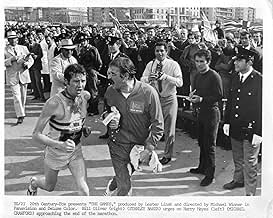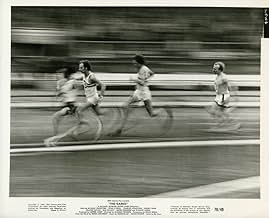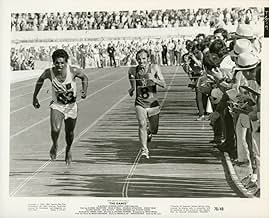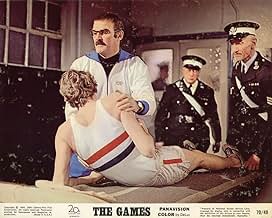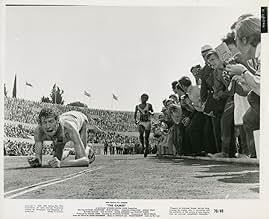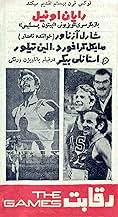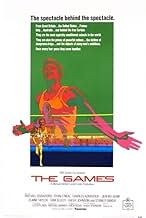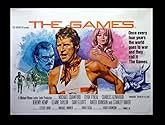Aggiungi una trama nella tua linguaFour marathon runners (one from England, one from the U.S., a Czechoslovakian, and an Australian Aborigine) prepare to run in the Olympic games. The film follows each one and shows what thei... Leggi tuttoFour marathon runners (one from England, one from the U.S., a Czechoslovakian, and an Australian Aborigine) prepare to run in the Olympic games. The film follows each one and shows what their motivations are for running in the games.Four marathon runners (one from England, one from the U.S., a Czechoslovakian, and an Australian Aborigine) prepare to run in the Olympic games. The film follows each one and shows what their motivations are for running in the games.
- Regia
- Sceneggiatura
- Star
Recensioni in evidenza
An interesting sports film from the early-'70s, relating to the striving for Olympic glory in the context of the Marathon and which is colourfully filmed in diverse settings focussing on a quartet of runners. Welshman, Stanley Baker is professionally superb as the martinet coach of Michael Crawford's runner while Irish-American actor, Ryan O'Neal's confident sandyhaired US athlete is amusing. Baker instills stiff discipline and ultra-high standards. Michael Winner would go on to direct Brando in the gothic 'The Nightcomers' and the violent western,'Chato's Land' which starred Charles Bronson in 1972.
This is a pretty decent film on one of my favorite subjects, the Olympics. This film pretty much takes its inspration from several real figures in Olympic history (Abebe Bikila, Dorondo Pietri and Emil Zatopek) and uses their stories as the basis of this film. Its just too bad that this film is rarely, if ever, shown on television anymore because it does show what motivates someone to run in the marathon and what it takes to complete it.
In 1970, between working with Oliver Reed in Swinging Sixties flicks and Charles Bronson in exploitation crime, a mainstream Michael Winner directed THE GAMES, centering on a group of worldwide runners training for the Rome Olympics... but the trainers are the most intriguing characters...
In particular Stanley Baker, at this point a British veteran actor (who always looked older than he actually was), as a former running champion with a limp so serious he never lets the viewer forget...
Which takes the kind of energy that's completely lacking in the extremely miscast Michael Crawford as a milkman turned record-breaking sprinter (randomly romancing ingenue Elaine Taylor), whose lightweight acting chops seems more befitting the quirky comedies he was used to...
Although his scenes with Baker are pretty good because the tough coach makes every scene count... As does the Australian Aborigine's own trainer, more of a promoter, in get-rich-quick-schemer (and kangaroo poacher) Jeremy Kemp, as offbeat-crooked as Baker is headstrong-intense...
Meanwhile Ryan O'Neal's American runner hardly has a coach at all... A pill-popping womanizer with a breezy (albeit also miscast) sex symbol appeal, he seems like part of another movie altogether....
In fact every participant's individual story from THE GAMES (including an aged Frenchman seeking a comeback) feels underdeveloped since director Winner, using a barrage of that era's zoom shots and choppy edits, has to stuff them all inside a single 100-minute sports programmer that passes the time decently...
But could have been better if Stanley Baker only had another runner/actor to train, and more time to do so.
In particular Stanley Baker, at this point a British veteran actor (who always looked older than he actually was), as a former running champion with a limp so serious he never lets the viewer forget...
Which takes the kind of energy that's completely lacking in the extremely miscast Michael Crawford as a milkman turned record-breaking sprinter (randomly romancing ingenue Elaine Taylor), whose lightweight acting chops seems more befitting the quirky comedies he was used to...
Although his scenes with Baker are pretty good because the tough coach makes every scene count... As does the Australian Aborigine's own trainer, more of a promoter, in get-rich-quick-schemer (and kangaroo poacher) Jeremy Kemp, as offbeat-crooked as Baker is headstrong-intense...
Meanwhile Ryan O'Neal's American runner hardly has a coach at all... A pill-popping womanizer with a breezy (albeit also miscast) sex symbol appeal, he seems like part of another movie altogether....
In fact every participant's individual story from THE GAMES (including an aged Frenchman seeking a comeback) feels underdeveloped since director Winner, using a barrage of that era's zoom shots and choppy edits, has to stuff them all inside a single 100-minute sports programmer that passes the time decently...
But could have been better if Stanley Baker only had another runner/actor to train, and more time to do so.
This movie has aged, of course it's going on for 40 years so that is understandable. Never the less it represents a time gone by, its politically incorrect, full of racially insensitive remarks and highlights the conflict with professionalism/amateurism, drugs and the political grandstanding that went on back in the 60's,70's and 80's in track and field. As an other reviewer says the Olympics was the ideal forum where sport was all about politics.
It's a movie really for track and field enthusiasts although it's interesting to see a very young Michael Crawford (who actually had top billing for this movie) and Ryan O'Neal in his love story glory (it had not been released) and a young Sam Elliot who you would never recognize today but sounds the same. If I hadn't known better I would have said his voice was dubbed, but no it actually was Elliot's voice which would become better known as his career progressed. Crawford never hit the big time in movies but would be better known in comedy and stage by the late 70's and 80's. O'Neal ironically became typecast in his love story role which he never really shook that off all but disappeared from the screen by 1980.
As for the political incorrectness, it starts almost at the beginning. Back in those days milk was the stable drink but nowadays because of the fear of heart disease and bad cholesterol gator aid or some ridiculously priced glucose based drink that is supposed to re-balance the fluids in the body would be the primary beverage, milk just won't cut it! In the second scene while at Yale University Reynolds gets into a "binge drinking" contest. Of course, that's really what it amounts to of but here it's innocently described as a 'Chug-a-lug' contest where the prize is a night with one of the (co-ed or sorority girl?) girl students. Both drinkers pass out and today Women's advocate groups and the college establishment would freak at this type of activity, you certainly can't make light of things like that today.
The aborigine Australian runner Sunny "who is used to the heat" and runs in bear foot learned to run because he chases kangaroos in the bush is also another politically incorrect stereotype that won't cut today either. Also portraying Harry Hayes coach Bill Oliver as a homosexual should not be overlooked. It was meant to be subtle but it didn't fool me at all, the aggression, the drooped moustache, the sexual tension with Hayes girlfriend as well as the jealous looks, it was just all too apparent.
It's obvious that a lot of the film was left on the cutting room floor, probably for time constraints, yet it is still allows for character development. In addition you can see at first hand the cultural differences and training methods each runner uses in the old days of "shamateurism ". I'd have to say that all of the athletes that were portrayed Harry Hayes, Vedick , Sunny Pintubi and Reynolds from the UK, Czechoslovakia, Australia and USA respectively were well cast and very believable as runners.
The climax of the movie is worth waiting for and the gut wrenching Jim Peters moment (Vancouver 1954) portrayed by Harry Hayes is a spectacle. Great commentary from both BBC broadcaster Ron Pickering and former US Olympian Rafer Johnson for NBC, it's well worth a watch for all of the above
It's a movie really for track and field enthusiasts although it's interesting to see a very young Michael Crawford (who actually had top billing for this movie) and Ryan O'Neal in his love story glory (it had not been released) and a young Sam Elliot who you would never recognize today but sounds the same. If I hadn't known better I would have said his voice was dubbed, but no it actually was Elliot's voice which would become better known as his career progressed. Crawford never hit the big time in movies but would be better known in comedy and stage by the late 70's and 80's. O'Neal ironically became typecast in his love story role which he never really shook that off all but disappeared from the screen by 1980.
As for the political incorrectness, it starts almost at the beginning. Back in those days milk was the stable drink but nowadays because of the fear of heart disease and bad cholesterol gator aid or some ridiculously priced glucose based drink that is supposed to re-balance the fluids in the body would be the primary beverage, milk just won't cut it! In the second scene while at Yale University Reynolds gets into a "binge drinking" contest. Of course, that's really what it amounts to of but here it's innocently described as a 'Chug-a-lug' contest where the prize is a night with one of the (co-ed or sorority girl?) girl students. Both drinkers pass out and today Women's advocate groups and the college establishment would freak at this type of activity, you certainly can't make light of things like that today.
The aborigine Australian runner Sunny "who is used to the heat" and runs in bear foot learned to run because he chases kangaroos in the bush is also another politically incorrect stereotype that won't cut today either. Also portraying Harry Hayes coach Bill Oliver as a homosexual should not be overlooked. It was meant to be subtle but it didn't fool me at all, the aggression, the drooped moustache, the sexual tension with Hayes girlfriend as well as the jealous looks, it was just all too apparent.
It's obvious that a lot of the film was left on the cutting room floor, probably for time constraints, yet it is still allows for character development. In addition you can see at first hand the cultural differences and training methods each runner uses in the old days of "shamateurism ". I'd have to say that all of the athletes that were portrayed Harry Hayes, Vedick , Sunny Pintubi and Reynolds from the UK, Czechoslovakia, Australia and USA respectively were well cast and very believable as runners.
The climax of the movie is worth waiting for and the gut wrenching Jim Peters moment (Vancouver 1954) portrayed by Harry Hayes is a spectacle. Great commentary from both BBC broadcaster Ron Pickering and former US Olympian Rafer Johnson for NBC, it's well worth a watch for all of the above
A more apt title might have been "The Marathon" since really this film deals more with that than the actual Olympic Games. In it, four runners, with disparate backgrounds, train and train in preparation for the big day when they will run 26 miles in just over two hours. Crawford plays a gawky and gangly milkman who, even in dress shoes, can outrun members of a local track team. Eventually, he is given a chance to improve himself under the direction of surly, obsessive coach Baker while girlfriend Taylor mopes. O'Neal is a cocky American who often doesn't push himself as far as he is capable of going and who drinks and cavorts regularly, activities which usually are an athlete's no-no. Compton is a simple Aborigine whose talents are being exploited for gambling profit by the thoughtless Kemp. Finally, Aznavour plays the world record holder - The Iron Man - who comes back into the fray to retain his title. To say that the editing is brisk on this film is an understatement. It's positively MTV-ish for the time it was made, though it occasionally verges on the choppy. The acting, for the most part, is fine. Crawford takes a while to seem realistic rather than comic, but eventually gets there. Baker digs deeply into his part and turns in a memorable performance. O'Neal was well cast for his role (and his then-wife Leigh Taylor-Young even pops up unbilled as a girl he wins in a drinking contest!) Compton is no actor, but manages to get by on an innate charm. Kemp has one of his most showy and prominent roles and enjoys himself fully. Aznavour has little to do (and is about the last thing one would expect to see as an Iron Man!), but he does all right. His child in the film has GOT to go down in history as one of the least attractive screen children EVER! There's a lot of great globe-trotting scenery, a nice trip into the world of 1970 and a cast that's peppered with decent British actors (not to mention an early appearance by handsome, baritone-voiced Elliott.) This isn't a spellbinding film, but it's a nice slice-of-life look at the backgrounds of these men and a glimpse into what it takes to attempt a marathon run. Until the big race, the stories rotate constantly, which helps with the pacing (though O'Neal is offscreen for a shockingly long time near the beginning.) Other interesting factors in the film include the politics of the Games and the depiction of racial relations in Australia. Widescreen viewing is recommended.
Lo sapevi?
- QuizA then-unknown Sir Elton John sang the Francis Lai and Hal Shaper-penned "From Denver to L.A." as part of the film's soundtrack, which was issued in the U.S. by Viking Records (LPS-105). He was so little-known at that point, that he was credited on the label as "Elton Johns". The label planned to issue the song as a single (VIK-1010, backed with "Warm Summer Rain" by The Barbara Moore Singers), and promotional copies were pressed, but John, who first hit stardom towards the end of 1970, had the record withdrawn before commercial copies could be pressed. Upon his reaching superstar status, promotional copies of the "From Denver to L.A." single have become prized collector's items and an interesting curio in John's recorded catalogue.
- BlooperAt once stage during a particularly twisty and narrow part of the race on Rome's streets, the pace vehicle is forced to go so slow that it forces leader Hayes almost to a standstill to avoid colliding with it.
- ConnessioniReferenced in Vsechnopárty: Episodio datato 14 aprile 2017 (2017)
I più visti
Accedi per valutare e creare un elenco di titoli salvati per ottenere consigli personalizzati
- How long is The Games?Powered by Alexa
Dettagli
- Data di uscita
- Paese di origine
- Lingua
- Celebre anche come
- The Games
- Luoghi delle riprese
- Copenaghen, Danimarca(kine weekly 16/11/1968)
- Azienda produttrice
- Vedi altri crediti dell’azienda su IMDbPro
- Tempo di esecuzione
- 1h 40min(100 min)
- Colore
- Proporzioni
- 2.35 : 1
Contribuisci a questa pagina
Suggerisci una modifica o aggiungi i contenuti mancanti

